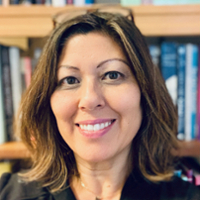
Professor of Religion
Year Started at JMU: 2007
flannefl@jmu.edu
Contact Info
Pronouns: she/her
Education:
Ph.D. in Religion, The University of Iowa (Judaism and Christianity in the Greco-Roman World)
M.A. in Religion, The University of Iowa
B.S. in Environmental Science, The College of William and Mary (Environmental Geology and Ecology)
Teaching:
Professor Flannery is a dedicated teacher who teaches in the areas of Hebrew Bible, Judaism, religious terrorism, religions of the world, religion and animals, and religion and the environment. She was a 2014-2015 State Finalist for the State Council for Higher Education in Virginia Outstanding Faculty Award and the 2012-2013 recipient of the Carl Harter Distinguished Teacher Award for the College of Arts and Letters at JMU. Her courses include: Religions of the World (REL 101); Introduction to the Hebrew Bible / Old Testament (REL 201); Judaism (REL 320); Angels, Demons, and Dreams in Early Judaism and Christianity (REL 333) Apocalypticism, Terrorism, and Peace (REL/IA 363); Religion, Animals, and the Environment (REL 366); and specialized senior seminars, such as Jewish Mysticism (REL 460). Her teaching is marked by an experiential, subject-centered style, which has included hands on examination of ancient artifacts, reenactments of the Community Meal of the Dead Sea Scroll community, and visits to local sustainable farms.
Research:
Frances Flannery, Ph.D. is the author and editor of numerous publications, including the co-edited Biblical Wisdom: Then and Now (Routledge, 2021), Understanding Apocalyptic Terrorism: Countering the Radical Mindset (Routledge, 2016), the co-edited The Bible in Political Debate: What Does It Really Say? (Bloomsbury/T&T Clark, 2016), the co-edited Experientia, Vol. 1: Inquiry into Religious Experience in Early Judaism and Christianity (Brill/SBL 2008), and Dreamers, Scribes, and Priests: Jewish Dreams in the Hellenistic and Roman Eras (Brill 2004). She specializes in apocalypticism in early Judaism and early Christianity, particularly as it relates to dreams, visions, and religious experience, but also as biblical studies relates to contemporary challenges such as religious terrorism, identity formation, environmental care, and religiously motivated violence. Her current research focus is eco-theology that addresses the relationship of earth, human, and non-human animals in the Hebrew Bible, bringing together her expertise in biblical studies with her former career in Environmental Science. During her research leave for Spring 2022 and as Trinity Longroom Hub Humanities Fellow, Trinity College in Dublin, Ireland, she is working on her book on an ecological interpretation of the Hebrew Bible. She spends much of her time engaging in community peacebuilding, interfaith dialogue, and public education on religion and climate change.
Selected Speaking Engagements:
“Jesus the Jewish Divine Physician: Understanding Healing in Early Christianity in its Jewish and Greco-Roman Contexts.” Center for Christian-Jewish Learning, Boston College (Boston, MA, March 17, 2022).
“A Covenantal Understanding of Human Impact on the Weather and Animals.” Religion/Water/Climate: Changing Cultures and Landscapes Conference, International Society for the Study of Religion, Nature, and Culture (University College Cork, Cork Ireland, June 15, 2019).
“Theorizing Asian Diaspora Identity: Rethinking the Relationship of the Hebrew Bible and Pseudepigrapha.” Theology of the Hebrew Bible Section, Society of Biblical Literature National Meeting (Denver, CO. Nov. 18, 2018).
“From Herem to Gog and Magog: The Genocidal Ideal in the Hebrew Bible and Early Jewish Texts.“ Plenary Lecture, Conference on Religion and Violence, McGill University and Concordia University (Montreal, Canada, April 17-20, 2018).
“Theorizing the Social Function of Torture and Torture Narratives: In-Group/Out-Group Formation as a Commitment Mechanism.” Torture, Abuse, and Desecration in the Name of Religion, Brown University (Providence RI, May 7-9, 2017).
“Countering Violent Extremism: Peace Strategies,” at conference on “The Ecology of Violent Extremism.” Toda Institute for Global Peace and Policy Research, Center for Justice & Peacebuilding at Eastern Mennonite University, and the Alliance for Peacebuilding (Harrisonburg VA, Nov. 5-6, 2016).
“Rethinking ‘Counter-terrorism’ in Light of the Rising Nuclear Threat from Apocalyptic Al Qaeda and ISIS.” Exploring the Religious-Policy/Security Nexus in Responding to Critical Contemporary Regional/Global Challenges, Kozmetsky Center, Fletcher School of Law and Diplomacy at Tufts University, with NATO, Public Diplomacy Division (Austin TX, Nov. 1-2, 2016).
"Our Apocalyptic Moment: The Rise of Terrorism, the Collapsing of Modernity, and the Fight for Social Memory.” Keynote Speaker and Professor of Master Class, Autumn School, NOSTER – Netherlands School of Theology and Religion and NISIS – Netherlands Interuniversity School of Islamic Study (Amsterdam, The Netherlands, Oct. 25-28, 2016).
Languages:
Native Fluency: English. Reading Fluency: Biblical Hebrew, Aramaic, Attic and Koine Greek, Syriac, French, German; Elementary Speaking Fluency: French, German. Learning: Korean, Coptic.
Service and Engagement with the World:
Professor Flannery is former Interim Academic Unit Head of the Dept. of Philosophy and Religion (2018-2020) and Founder and former Director of the Center for the Interdisciplinary Study of Terrorism and Peace (CISTP) at JMU (2013-2019), which brought together intelligence analysts, NGOs, policy makers, and academics to change paradigms related to countering violent extremism. For the Society of Biblical Literature, she is a contributing member of the Educational Resources and Review Committee (2016-present), supervising and creating public education for SBL. Flannery is deeply committed to issues of inclusion on campus, the local community, and the academy, and is a 2017 Faculty Recipient of the James Madison University Diversity Enhancement Award and 2016 Recipient, IDEA (Innovation in Diversity, Education, and Access) Grant from the Office of Access and Inclusion for her program support of first-generation college students.
